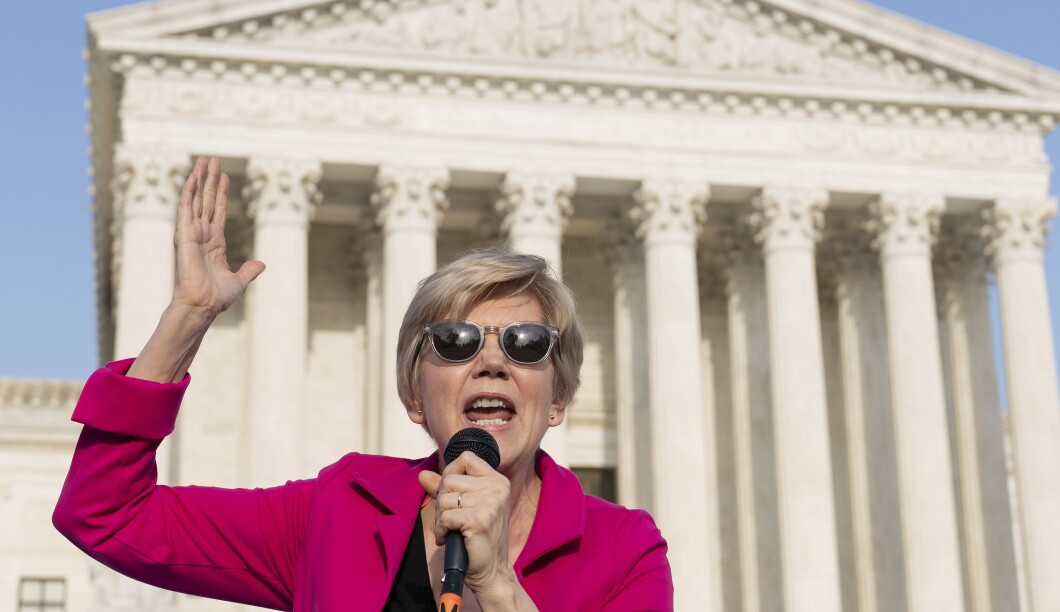
The Supreme Court will weigh arguments Tuesday in a case that challenges the funding design of the Consumer Financial Protection Bureau and seeks to effectively shut down the agency created during the Obama administration.
Formed amid the 2008 financial crisis, the CFPB’s purpose is to protect consumers from predatory behavior from banks and other institutions while enforcing consumer financial laws. Sen. Elizabeth Warren (D-MA) is credited with conceiving the agency and has been sounding alarms about the oral arguments.
SUPREME COURT’S NEW TERM TO ENCOMPASS GUNS, ABORTION, AND FRESH SOCIAL MEDIA CHALLENGES

A “bad decision by the Supreme Court could wreck the financial security of millions of families and turn our economy upside down,” the Massachusetts Democrat said Thursday during an event hosted by the Center for American Progress in the District of Columbia.
According to Warren and other Democrats aligned with the Biden administration‘s defense of the CFPB, a ruling against the agency’s funding mechanism could jeopardize its future activity and may also raise questions about the regulations it created in the 13 years since its formation.
The lawsuit, Consumer Financial Protection Bureau v. Community Financial Services Association of America, was brought by key players in the payday lending industry who say the CFPB is unconstitutionally funded by the Federal Reserve, as most federal agencies receive appropriations from Congress.
Last year, the 5th Circuit Court of Appeals, considered one of the most conservative appellate courts in the nation, ruled that the CFPB’s funding structure is unconstitutional.
Plaintiffs in the case contend that the CFPB’s funding structure violates the Constitution’s appropriations clause because it falls outside of the annual congressional appropriations process, a claim that is backed by some pro-small business groups.
“Currently, the CFPB is funded without Congressional oversight through the appropriations process, which is unconstitutional and leads to the Bureau overstepping its bounds,” Beth Milito, executive director of the National Federation of Independent Business’s Small Business Legal Center, told the Washington Examiner in July, adding that “Small businesses are at risk of costly penalties and burdensome inspections.”
Joseph Lynyak is a partner at the international firm Dorsey & Whitney and is on the fence about the plaintiffs’ argument, telling the Washington Examiner the appropriations clause “has a long history of permitting Congress to fund governmental functions through what are essentially user fees,” citing the U.S. Postal Service as one example.
The Justice Department submitted a brief citing that the current interpretation of the appropriations clause shares similarities to how it was applied during the founding, an element Lynyak said “may be attractive to that portion of the court that relies on the ‘original intent’ approach to constitutional interpretation.”
Meanwhile, ethics watchdogs who have levied scrutiny over alleged lapses in judgment by some of the high court members have already called on Justices Clarence Thomas and Samuel Alito to step aside from considering the case on Tuesday. Two left-of-center groups, the Revolving Door Project and Accountable.US, have said the pair of justices should recuse themselves from the matter over perceived conflicts.
For Alito, it’s his one-time 2008 fishing trip to Alaska with billionaire Paul Singer that prompted Accountable.US President Caroline Ciccone to call for him to step aside. On Thomas’s end, RDP said a recent report by the nonprofit outlet ProPublica, revealing his appearance at Koch Network events, should disqualify him because the network “spent years lobbying to gut” the law that created the CFPB.
While both justices do not show any likelihood of recusing from the CFPB case, Thomas made a rare decision to recuse from a matter on Monday involving John Eastman, the ex-attorney for former President Donald Trump, who recently tapped the high court for relief.
Alito on Monday recused from some cases that have connections to stock that he owns and has come out critical of reports that have highlighted alleged ethical lapses from members of the bench, writing in a June 20 Wall Street Journal op-ed that ProPublica “Misleads Its Readers.”
CLICK HERE TO READ MORE FROM THE WASHINGTON EXAMINER
A ruling in the CFPB case is due months from now, but Lynyak mentioned the high court’s Chief Justice John Roberts, a known moderate and negotiator among the nine justices, could seek to dampen a potentially swift blow to the commission that Democrats like Warren are anticipating.
“The chief justice has positioned himself as a moderating deciding vote in several recent decisions, which might be anticipated in this case,” Lynyak said.





